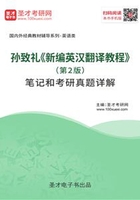
5.2 翻译示例汇总
一、语义的差异
1. a) I believed then that I would die there, and I saw with a terrible clarity the things of the valley below.(N. S. Momaday: “The End of My Childhood”)
【译文】这时我觉得我要死在那儿了,而下面山谷里的景致却看得异常清晰。
b) The large mammalian brain is the most complicated thing, for its size, known to us.(I. Asimov: “The Difference between a Brain and a Computer”)
【译文】大型哺乳动物的大脑,就其体积而言,是我们所知晓的最复杂的机体。
c) When I am finished, things will be precisely as they were before...(A. Heckscher: “Doing Chores”)
【译文】每次做完之后,一切都依然如故……
d) Mr. Somerville—a most delightful man. to whom my debt is great—was charged with the duty of teaching the stupidest boys the most disregarded thing—namely, to write mere English.(W. Churchill: Harrow)
【译文】萨默维尔先生——一个令我感激不尽的、十分讨人喜欢的老师——负责教授最愚笨的学生最令人看不起的课程,即用英文写作。
e) What a fine thing for our girls!(J. Austen: Pride and Prejudice, Ch. 1, V. I)
【译文】真是女儿们的好福气啊!
2. ... in the end I had to have a caesarean, which just knocked me for six.(L. Duckworth: “The Shock of Motherhood”)
【译文】最后我只好做剖腹产,这下可把我彻底摧垮了。
【解析】knock...for six是一个英语俚语,意思是“彻底打败,完全挫败”。
3. “Typical,” said one cop when we couldn’t even agree on how tall the men were.
【译文】当我们连歹徒的身高都不能取得一致意见时,一个警察说:“真扫兴。”
【解析】这里不能将typical译成“典型”,译者应细揣摩上下文,据语境来确定语义。这句话的前文说到:一批警察根据电话举报赶到出事现场,却没发现任何线索,就连歹徒身材有多高也意见不一致。在这种无奈的情况下,一个警察说了一声“typical”。Typical在《英汉大词典》,第三个释义是:(表示对人、事或情况的批评或抱怨)令人失望的,糟糕的。
二、词法的差异
4. Mrs. Long has just been here, and she told me all about it.(J. Austen: Pride and Prejudice, Ch.1, V. Ⅰ)
【译文】朗太太刚刚来过。她把这事一五一十地全告诉我了。
5. I would have asked why Mrs. Dean had deserted the Grange; but it was impossible to delay her at such a crisis, so I turned away and made my exit ...(E. Bronte: Wuthering Heights, Ch. 18, V. Ⅱ)
【译文】我原想问问迪安太太为什么丢下田庄走了,但是在这个节骨眼上是不能耽搁她的,于是我便转身走了……
6. “What was I talking of?” said she, beginning again when they were all in the street.(J. Austen: Emma, Ch.9, V. Ⅱ)
【译文】“我刚才说什么来着?”等大伙来到了街上,她又说起来了。
7. Before I arrived in sight of it, all that remained of day was a beamless, amber light along the west; but I could see every pebble on the path, and every blade of grass, by that splendid moon.(E. Bronte: Wuthering Heights, Ch.18, V. Ⅱ)
【译文】我还没有望见那座住宅,天早已暗下来了,只有西边天际还剩下一抹朦胧的琥珀色的余晖,但是我仍可借助皎洁的月光,看清小路上的每一颗石子,每一片草叶。
8. “No, read it over first correctly, without a single mistake.”(E. Bronte: Wuthering Heights, Ch.18, V. Ⅱ)
【译文】“不行,先给我准确地念一遍,不许有一个错。”
9. ... but to almost everybody she was a fine and picturesque country girl, and no more.(T. Hardy: Tess of the d’Urbewilles, Ch.2)
【译文】……不过,几乎在每个人看来,她只不过是一个标致如画的乡下姑娘而已。
10. “My dear Mr. Bennet,” replied his wife, “how can you be so tiresome! You must know that I am thinking of his marrying one of them.”(J. Austen: Pride and Prejudice, Ch.1, V. Ⅰ)
【译文】“亲爱的贝内特先生,”太太答道,“你怎么这么令人讨厌!告诉你吧,我在琢磨他娶她们中的一个做太太呢。”
11. “Can you deny that you have done it?” she repeated.
With assumed tranquility he then replied, “I have no wish of denying that I did everything in my power to separate my friend from your sister ...”(J. Austen: Pride and Prejudice, Ch.11, V. Ⅱ)
【译文】
“你敢说你没干吗?”伊丽莎白又问了一遍。
达西故作镇定地答道:“我不想否认,我的确竭尽全力拆散了我的朋友和你姐姐的姻缘……”
12. The first point about chores is that they are repetitive. They come every day or there-abouts, and once done they require after a certain time to be done again.(A. Heckscher: “Doing Chores”)
【译文】家务事的第一个特点,是反反复复。几乎天天都有,而且做完之后,过一定时间又要重做一番。
【解析】在英语中,chores由于用的是复数,代词用they也是顺理成章的事,但汉语的“家务事”本来没有单复数之分,非要用“它们”来指代,总觉得不妥,应尽量避免。
三、句法的差异
13. I must confess that with their repetition, and perhaps because of their very inconsequence, chores can in the end evoke a mild sort of satisfaction.
【译文】我必须承认。正由于其反复性,或还由于其无关紧要,家务事到头来还能给人带来些许的满足感。
14. As we resumed walking I blurted out, “It’s a lucky thing it happened that way. You wouldn’t have met Mother.”(R. Zacks: “The Date Father Didn’t Keep”)
【译文】我们继续往前走,我又冒出一句话:“这样倒是一件幸事。不然你就遇不上妈妈了。”
【解析】原文从句与主句之间必须有个as来连接,但译成汉语时却不需要任何连接词,直接译成“我们继续往前走,我又冒出一句话”即可。
15. Ordered! Oh, everything is ordered when a person has to find some way out when he has been stupid.(M. Twain: The Man That Corrupted Hadleyburg)
【译文】命中注定啊,一个人干出了傻事情,要替自己找理由,那就什么都是命中注定!
【解析】原文有两个表示时间的when状语从句,翻译时都将关联词when略去不译,而完全依靠语序直接组合。这种译文充分展示了汉语的简洁特征!
16. You and the girls may go, or you may send them by themselves, which perhaps will be still better, for as you are as handsome as any of them, Mr. Bingley might like you the best of the party.(J. Austen: Pride and Prejudice, Ch.1, V. Ⅰ)
【译文】你带着女儿们去就行啦,要不你索性打发她们自己去,这样或许更好些,因为你的姿色并不亚于她们中的任何一个,你一去,宾利先生倒作兴看中你呢。
【解析】译文采取了形合译法。译文中使用了“要不”“这样”“因为”等连接词,清晰地传达了原语的逻辑关系,从而更能体现说话人的讽刺口吻。
17. It will be no use to us, if twenty such should come since you will not visit them.(J. Austen: Pride and Prejudice, Ch.1, V. Ⅰ)
【译文】既然你不肯去拜访,即使搬来二十个,那对我们又有什么用。
18. Not only did we learn English parsing thoroughly, but we also practiced continually English analysis.(W. Churchill: “Harrow”)
【译文】我们不仅彻底地学会了句法分析,而且不断地练习英文分析。
【解析】由于否定词not前置,助动词did放在主语we前面,但汉语译文却只能采取正常的主谓语序。
19. Yet few knew, and still fewer considered this.(T. Hardy: Tess of the d’Urbervilles, Ch. 2)
【译文】然而,这一点很少有人察觉,也更少有人去关注。
【解析】宾语this置于谓语动词consider后面,译成汉语时,则最好把宾语提前。如果采取英语的句序,就显得有点欧化气息:然而,很少有人察觉(这一点),也更少有人关注这一点。
20. That altered, frightened, fat face told his secret well enough.(W. M. Thackeray: Vanity Fair, Ch. 32)
【译文】他的胖脸蛋儿吓得走了样子,他心里的打算一看就知道。
21. She had such a kindly, smiling, tender, gentle, generous heart of her own.
【译文】她心地厚道,为人乐观,性情温柔,待人和蔼,器量又大。
22. I saw a little, yellow, ragged, lame, unshaven beggar.
【译文】我看见一个要饭的,身材矮小。脸色苍黄,衣衫褴褛,瘸腿,满脸胡子。
23. At any rate, she cannot grow many degrees worse, without authorizing us to lock her up for the rest of her life.(J. Austen: Pride and Prejudice, Ch. 18, V. Ⅱ)
【译文】不管怎么说,她要是变得更坏的话,那我们以后就有理由把她一辈子关在家里。
【解析】无论从语法上看,还是从意思上看,谓语中的not一词都不是否定grow many degrees worse,而是否定without引起的短语。
24. The college student caught cheating does not even blush. He shrugs his shoulders and comments: “Everybody does it, and besides, I can’t see that it really hurts anybody.”(J. Krutch: “The New Immorality”)
【译文】大学生考试作弊被发现,连脸都不红,而只是耸耸肩,振振有词地说:“大家都是这么干的。再说,我看这实在不会损害任何人。”
四、思维的差异
25. a) I doubt whether he likes this book.
【译文】我看他不喜欢这本书。
b) I doubt whether he does not like this book
【译文】我想他是喜欢这本书的。
【解析】doubt后面所接的whether引起的宾语从句如果表肯定意义,那么主语的看法应该是否定的,而如果表否定意义,主语的看法就应该是肯定的。
26. In this regard a chore is the very opposite of a “happening”—that strange sort of event which a few years back was so much in fashion.(A. Heckscher: “Doing Chores”)
【译文】在这个意义上,家务事与“偶然事件”——几年前盛行的事件剧里的那种异常事件——恰好相反。
【解析】原文的主句用的是现在时,从句里用的是过去时,所以a few years back应译成“几年前”,这样才符合逻辑。
27. I said, “Dad, you don’t have to—”
“Oh, yes, I want to tell you. I don’t want you wondering about this ...”(R. Zacks: “The Date Father Didn’t Keep”)
【译文】我说:“爸,你用不着——”
“哦,不,我要告诉你。我不想让你胡思乱想……”
【解析】儿子听说父亲年轻时有过一段浪漫史,为了照顾父亲的面子,就说“你不用(跟我细说)”了,但父亲怕儿子“胡思乱想”,就回答说:“Oh, yes, I want to tell you.”这个yes应该译成“不”。
28. Jane was as much gratified by this as her mother could be, though in a quieter way.(J, Austen: Pride and Prejudice, Ch.1, V. Ⅲ)
【译文】简和母亲一样,觉得非常得意,只是不像母亲那样唧唧喳喳。
【解析】这句话中in a quieter way指的是quieter than her mother,但译者不能因此而译成“以比她母亲更安静的方式”,因为那位母亲不仅不安静,而且总是唧唧喳喳的,所以,这里还是译成“只是不像母亲那样唧唧喳喳”为好。
29. for what can be prettier than an image of Love on his knees before Beauty?(M. Thackeray: Vanity Fair, Ch. 15)
【译文】……痴情公子向美貌佳人跪下求婚,还不是一幅最赏心悦目的画儿吗?
【解析】love和beauty是两个抽象名词,这里译者化抽象为具体,将Love译成“痴情公子”,将beauty译成“美貌佳人”。
30. Phases of her childhood lurked in her aspect still.(T. Hardy: Tess of the d’Urbervilles, Ch.2)
【译文】她的容貌还隐约保留着童年的特征。
【解析】在汉语译文中,原文的主语(phases of her childhood)被译成了宾语(“童年的特征”),而原文的前置词宾语(her aspect)却被译成了主语(“她的容貌”),这是各自的语言规律所决定的。
31. It is often said ... that our seemingly great growth in social morality has oddly enough taken place where private morality ... seems to be declining.(J. Krutch: “The New Immorality”)
【译文】人们常说,……我们的社会道德似乎有了长足的进步,而令人奇怪的是,就在我们这个社会里,个人道德观念……却似乎正在沉沦。
【解析】英语喜欢多用被动语态,这也是西方人喜欢抽象的一个表现形式。在这句话里,英语原文用it作形式主语,自然属于抽象概念,汉语译文不宜如法炮制,便改为“人们”作主语。